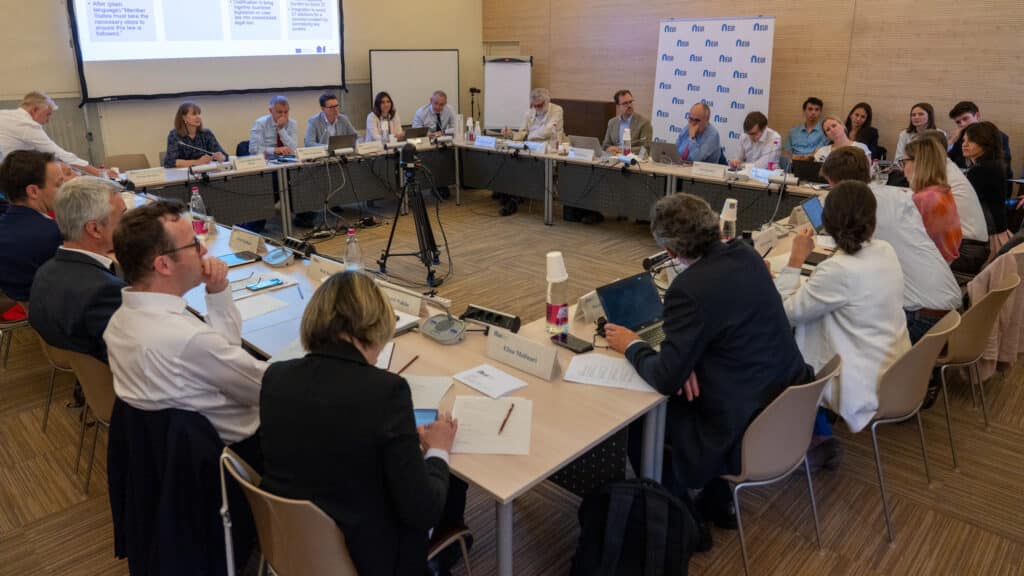Simplification of regulation is high on the policy agenda
This is the first installment of the Topic of the Month: Reflections on the FSR Spring Policy Dialogue
In November 2024, the conclusions of the EU Council in Budapest called for a “ simplification revolution”. In February 2025, Draghi argued for regulatory simplification with this quote in Forbes: “Europe is already sabotaging its own economy far more than U.S. tariffs could”.
In 2025, The European Commission proposed to simplify:
- sustainability reporting with the headline “savings of €40 billion compliance costs by exempting 80% of companies previously under the Corporate Sustainability Reporting Directive (CSRD)”, which are the smaller companies with less than 1k employees.
- the Carbon Border Adjustment Mechanism (CBAM), by exempting importers with less than 50 tons per year of iron and steel, aluminium, fertilizers and cement with the headline “90% of importers, only 1% of emissions under CBAM”.
Not everyone is enthusiastic about this simplification agenda. Bas Eickhout (Green MEP) on LinkedIn in March 2025: “… if we think that Europe’s industry will be saved by less reporting, we are not being simple, but simplistic. Europe should do better than a ‘ Trump light’ agenda.”
Why regulations can become too complex
As we combine multiple policy objectives, like sustainability, affordability, and security in energy, we will have many regulatory instruments working in parallel with complex interactions. Even if we try to develop policy and regulation holistically, this is very much a process that requires fine-tuning.
In the case of the EU legislative process, regulatory impact assessments can be improved to pay more attention to compliance costs, but these assessments are often under time pressure, and when the European Parliament and EU Council introduce amendments to legislative proposals, they are not subject to impact assessments.
Even if regulation is introduced with the best intentions, the rules can prove to be more complex to implement than they need to be, and/or less useful as imagined.
Times change, regulations also must evolve and can become obsolete in some cases. Simple solutions are not always politically feasible, pragmatic compromises can however, turn out to be too complex and costly. Last, but not least, there is also the politics of regulation. Regulation at local versus national, or EU level, can also be seen as a power struggle between different institutions.
How a simplification agenda can be part of the solution
As illustrated in the above recent examples on CBAM and sustainability reporting, simplification can be about reducing the costs of complying with regulations. The costs of filing forms, keeping records, reporting data, applying for permits or licenses indeed need to be kept under control. Especially for smaller companies, the individual costs can easily be higher than the collective benefits.
The simplification agenda can also be about cleaning up regulations by amending or repealing multiple legal acts at once, or with a “codification” to bring together scattered legislation or case law into consolidated legal text. The total number of regulatory initiatives can also be managed more carefully with more consideration for the cumulative impact of regulations.
If we want to be more ambitious, the simplification agenda could strengthen the governance of the policies we have in place. This could be done by making it easier to enforce the rules at national level, by harmonising some of the rules at the EU level to reduce the regulatory burden by a factor of 27, or by centralising key decision powers to avoid 27 solutions to a common problem.
Governance can also evolve with the progress in integrating our markets across Europe. At the same time, it is important to keep in mind subsidiarity, proportionality and differences in Member States energy systems both for efficiency and acceptance reasons.
Why a simplification agenda also has its risks
A simplification agenda can derail. Simplification can be reduced to deregulation serving specific interests, at the expense of the general interest. We see an extreme version of that emerging in the US, and worries have also been expressed in Europe that “simplification” will be used as an excuse to undermine the achievements of the EU Green Deal, or to prevent the introduction of regulation in areas where more regulation is needed.
By engaging in the simplification agenda, the Florence School of Regulation (FSR) would like to help identify ideas for simplification with more benefits than costs. Energised by an excellent discussion in our spring policy dialogue, we will continue to work on the topic. More is coming!






